Growth Hacking Culture
The Growth Hacking Culture Podcast is a series of insightful interviews with prominent experts on mindsets, skills and mental resources to grow individually, lead motivated teams and create human-centric work cultures.
These episodes are about thought provoking ideas to scale up and growth hack human-centric and performing work cultures.
Hosted by Ivan Palomino.
The Growth Hacking Culture Podcast is a series of insightful interviews with prominent experts on mindsets, skills and mental resources to grow individually, lead motivated teams and create human-centric work cultures.
These episodes are about thought provoking ideas to scale up and growth hack human-centric and performing work cultures.
Hosted by Ivan Palomino.
Episodes
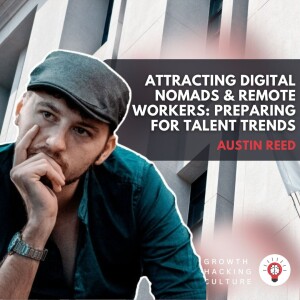
Wednesday May 15, 2024
Wednesday May 15, 2024
From an estimated 7 million pre-pandemic in 2019, the digital nomad population soared to over 15.5 million by 2021, and projections indicate a staggering increase to over 35 million by 2023, marking a fivefold surge in just four years. Beyond their tech-savvy skills, digital nomads exhibit remarkable creativity. Moreover, they prioritize purpose-driven work, seeking opportunities that resonate with their values and provide fulfillment beyond financial remuneration.
About Austin Reed, founder of Horizon Dev
Austin is a seasoned digital nomad boasting 8 years of extensive global exploration spanning 26 countries. Through Horizon Dev LLC, his software development agency, Austin specializes in streamlining processes and crafting bespoke digital solutions to empower businesses.
Contact Austin on LinkedIn https://www.linkedin.com/in/automationsexpert/
or in his website https://horizon.dev/
What We Discussed in this Episode about Attracting Digital Nomads:
- What Motivates Individuals to Embrace Nomadic Lifestyles?- Distinguishing Factors: Traditional Talent vs. Digital Nomads- Crafting a Robust Remote Work Environment to Enhance Team Bonding and Participation- Optimal Technologies and Resources for Seamless Remote Communication and Cooperation- The Significance of Purpose in Contemporary Work Settings: Insights from Digital Nomads and Remote Employees- Future Work Landscape: Anticipated Trends in Talent Recruitment and Remote Work Frameworks
#####
It is now possible to listen LIVE to the voice of your employees
Culturama Live is an AI system that helps boards and management understand their company’s true state by continuously analyzing crowdsourced employeeopinions, sentiments and ideas in their own words.
Learn more: https://www.peoplekult.com/ai-people-voice-and-culture
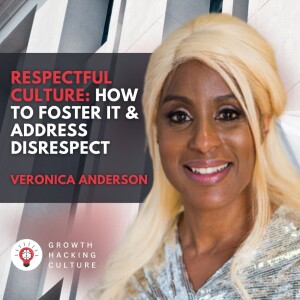
Monday May 06, 2024
Monday May 06, 2024
In a study conducted by McKinsey & Company in 2019, a significant correlation was identified between feelings of disrespect and employee turnover. The research revealed that employees who perceived being "treated unfairly" were twice as inclined to contemplate leaving their positions in comparison to those who felt valued and respected. Building a Respectful Workplace Culture has become a milestone for human-centric organizations.
About my GHC guest Dr. Veronica Anderson
Dr. Veronica Anderson is a distinguished Ivy-League educated eye surgeon, certified Kolbe and Human Design relationship coach, and bestselling author of "Get The Respect You Deserve: 7 Secrets to Getting Heard in Your Job and in Your Relationship". Dr. Veronica, a Princeton University graduate, combines medical proficiency with relationship coaching, offering valuable insights into earning respect in both professional and personal spheres.
Reach out Veronica Anderson on:
LinkedIn https://www.linkedin.com/in/drveronicaanderson/
Website http://drveronica.com/
What We Discussed in this Episode on How to Foster It & Address Disrespect at Work:
- Importance of Respect in Human Psychology
- Coping Strategies for Employees in a Disrespectful Work Environment
- Impact of Personal Actions on How Others Treat Us
- Techniques for Managers to Identify Signs of Disrespect
- How to Foster It & Address Disrespect at Work
###
Sign up for the Simply Human Newsletter (monthly email newsletter): https://simplyhuman.substack.com
Follow the Growth Hacking Culture Podcast: https://www.peoplekult.com/podcast-work-culture
Follow Ivan Palomino on Twitter: https://twitter.com/ivanpalomino
Follow Ivan Palomino on LinkedIn: https://www.linkedin.com/in/ipalomino/
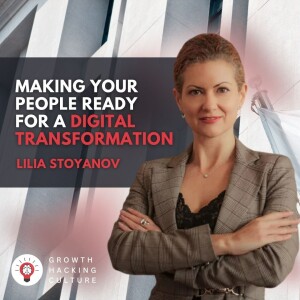
Monday Apr 29, 2024
Monday Apr 29, 2024
In the digital transformation era, employees face a dual landscape of opportunities and challenges. Embracing new technologies promises growth but also highlights a widening skills gap. Studies show automation could impact 60% of job activities. Research indicates that 38% of employees resist change, with job insecurity looming due to automation. Despite concerns, projections suggest creating 9 million new jobs by 2030 in response to technological advancements.
About Lilia Stoyanov
Lilia Stoyanov is the CEO of Transformify, a fintech expert, professor at Zigurat Business School, and an expert evaluator for Horizon 2020 at the European Commission. She has received prestigious awards including the 2013 Coca-Cola Enterprises Finance Excellence Award, the 2017 First Women Award, and the 2018 Female Entrepreneur Enterprise Award in the UK, recognizing her notable contributions to finance, entrepreneurship, and technology.
Reaching out Lilia
Linkedin https://www.linkedin.com/in/lilia-stoyanov-fcca-41972b14/
Insta https://www.instagram.com/transformify2320/
Transformify Website https://www.transformify.org/
What We Discussed in the Episode on the People Side of Digital Transformation:
- Key Challenges in Workforce Preparation for Digital Transformation- How to Assess Employee Digital Readiness: Practical Tips for Companies- Building a Culture of Continuous Learning for Embracing New Technologies- Balancing Innovation and Operational Efficiency: Strategies for Digital Transformation- Effective Strategies for Upskilling and Reskilling Employees in the Digital Age
Recommended content on digital transformation
The Innovation Paradox: Experiment and Fail Fast
Building a Customer-Centric Culture: Embracing Agility and Innovation
###
Sign up for the Simply Human Newsletter (monthly email newsletter): https://simplyhuman.substack.com
Follow the Growth Hacking Culture Podcast: https://www.peoplekult.com/podcast-work-culture
Follow Ivan Palomino on Twitter: https://twitter.com/ivanpalomino_
Follow Ivan Palomino on LinkedIn: https://www.linkedin.com/in/ipalomino/
About the Growth Hacking Culture Podcast
The Growth Hacking Culture Podcast is a series of insightful interviews with prominent experts on mindsets, skills and mental resources to grow individually, lead motivated teams and create human-centric work cultures. These episodes are about thought provoking ideas to scale up and growth hack human-centric and performing work cultures. Hosted by Ivan Palomino.
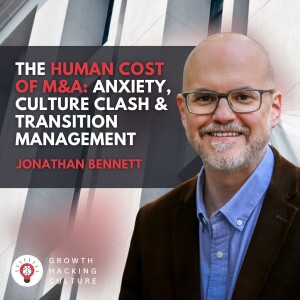
Tuesday Apr 23, 2024
Tuesday Apr 23, 2024
Mergers and acquisitions (M&A) often lead to significant employee turnover, morale decline, and productivity loss. Studies reveal that within just 24 months post-M&A, 50% of employees leave, while 70% experience a morale dip. Productivity can plummet by 20-30% in the short term due to heightened uncertainty. Prioritizing employee well-being during M&A is crucial for minimizing disruptions and fostering successful integration.
About Jonathan Bennett
Jonathan Bennett, a seasoned advisor and executive coach, specializes in guiding founders, CEOs, and C-suite leaders towards overcoming their organization's most formidable challenges while staying true to their purpose.
With a wealth of experience, he founded ClearlyThen, following successful ventures in management consulting and senior executive positions within the healthcare industry. Jonathan's expertise offers invaluable insights for leaders navigating complex business landscapes, ensuring sustainable growth and impactful decision-making.
Reach Out Jonathan Bennett:
On his LinkedIn Profile: https://www.linkedin.com/in/bennettjonathan/
On his website https://clearlythen.com/
What We Discussed in the Episode on the Human Cost of M&A:
- Unveiling the Human Side of M&A: Understanding Failure from a Human Perspective- Navigating Emotional Turbulence: Employee Phases in M&A and Effective Management Strategies- Transparent Transition: Addressing Employee Concerns in M&A Communication- Merging Cultures: Overcoming Challenges in Work Culture Integration Post-M&A- Roadmap to Success: Essential Steps for Effective Change Management in M&A- Mastering Emotional Agility: Success Stories in M&A Emotional Navigation- Leading with Empathy: Guidance for Safeguarding Employee Well-being in M&A Journeys
###
Sign up for the Simply Human Newsletter (monthly email newsletter): https://simplyhuman.substack.com
Follow the Growth Hacking Culture Podcast: https://www.peoplekult.com/podcast-work-culture
Follow Ivan Palomino on Twitter: https://twitter.com/ivanpalomino_
Follow Ivan Palomino on LinkedIn: https://www.linkedin.com/in/ipalomino/
About the Growth Hacking Culture Podcast
The Growth Hacking Culture Podcast is a series of insightful interviews with prominent experts on mindsets, skills and mental resources to grow individually, lead motivated teams and create human-centric work cultures. These episodes are about thought provoking ideas to scale up and growth hack human-centric and performing work cultures. Hosted by Ivan Palomino.
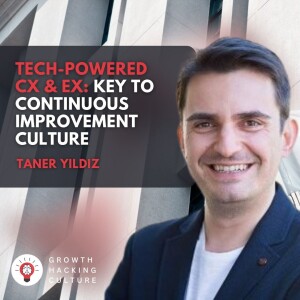
Monday Apr 15, 2024
Monday Apr 15, 2024
Developing a robust Continuous Improvement Culture is vital for corporate success but faces significant challenges. Resource constraints such as limited budgets and overloaded employees hinder innovation. Cultural bottlenecks, where employee mindsets affect customer interactions, present additional hurdles. Overcoming resistance to change and fostering a culture of continuous improvement are essential steps. By addressing these challenges head-on, corporations can unlock their full potential for innovation and excellence.
About Taner Yildiz [founder of Happ Consulting]
Taner Yildiz is a veteran navigating dual challenges in the realms of culture and resource constraints within employee and customer experiences. He stands as the innovative mind behind one of the pioneering AI platforms designed to live stream signals, facilitating ongoing enhancements in both employee and customer interactions.
As the founder of Happ Consulting Services, Taner spearheads a transformative journey toward optimized experiences for all stakeholders involved.
Reach Taner on LinkedIn https://www.linkedin.com/in/yildiztaner/
or on Happ Consulting website https://www.happcons.com/
What We Discussed in this Episode about Tech for CX and EX:
- Understanding Continuous Improvement Culture: Definition and Importance- Enhancing Customer Experience through Positive Employee Experience: The Direct Connection- Organizational Culture's Role in Shaping Employee and Customer Experiences- Overcoming Barriers to Amplifying the Impact of Employee Experience on Customer Experience- Leveraging Feedback Loops: A Key to Continuous Improvement in EX and CX- Anticipating Tech Trends (ML/AI/NLP) for Accelerated Continuous Improvement- Effective Measurement of Positive Employee Experience Impact on Customer-Centric Outcomes
🌟Learn more about The People Agile Experience platform powered by AI and automation https://www.peoplekult.com/agile-employee-customer-experience
###
Sign up for the Simply Human Newsletter (monthly email newsletter): https://simplyhuman.substack.com
Follow the Growth Hacking Culture Podcast: https://www.peoplekult.com/podcast-work-culture
Follow Ivan Palomino on Twitter: https://twitter.com/ivanpalomino_
Follow Ivan Palomino on LinkedIn: https://www.linkedin.com/in/ipalomino/
About the Growth Hacking Culture Podcast
The Growth Hacking Culture Podcast is a series of insightful interviews with prominent experts on mindsets, skills and mental resources to grow individually, lead motivated teams and create human-centric work cultures. These episodes are about thought provoking ideas to scale up and growth hack human-centric and performing work cultures. Hosted by Ivan Palomino.
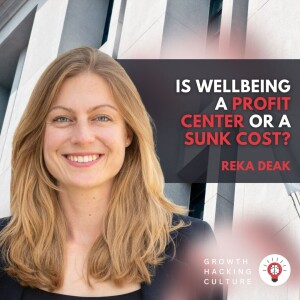
Monday Apr 01, 2024
Is Wellbeing a Profit Center or a Sunk Cost? with Reka Deak
Monday Apr 01, 2024
Monday Apr 01, 2024
Amid the pandemic, the concept of a human-centric workplace soared in Google searches, with HR institutions posting 2-3 articles weekly on the topic. Studies underscore its importance: PwC notes 83% of executives see it vital for innovation; University of Warwick research shows 12% productivity gains from happy employees; Gallup finds 21% higher profitability in companies with engaged staff. These findings emphasize the significance of prioritizing employee well-being and engagement for organizational success.
Despite these numbers many are still unsure that investing on wellbeing is worth.
About Reka Deak (founder of Wellbeing Designers)
Reka Deak is the visionary Founder of Wellbeing Designers, a pioneering company dedicated to fostering human-centric organizations through Strategic Wellbeing Education. With a senior advisory role at The Josh Bersin Company and previous experience as a management consultant for industry giants like KPMG and Accenture, Reka brings a wealth of expertise in enabling Wellbeing Culture.
Reaching Reka Deak
Reka's personal site https://www.rekadeak.com/
Wellbeing Designers https://www.wellbeing.design/
Reka's LinkedIn https://www.linkedin.com/in/rekadeak/
What We Discussed in this Episode on Is Wellbeing a Profit Center or a Sunk Cost?
- Defining Wellbeing in Corporate Settings- Post-COVID Investments in Employee Wellbeing- Unveiling the Science behind Wellbeing Programs- Assessing the Impact of Employee Wellbeing Interventions- Uncovering Truths about Employee Wellbeing- Expert Perspectives on Emerging Trends- Consequences of Ignoring Employee Wellbeing- Profit Center or Expense? The Economic Outlook of Corporate Wellbeing
###
Sign up for the Simply Human Newsletter (monthly email newsletter): https://simplyhuman.substack.com
Follow the Growth Hacking Culture Podcast: https://www.peoplekult.com/podcast-work-culture
Follow Ivan Palomino on Twitter: https://twitter.com/ivanpalomino_
Follow Ivan Palomino on LinkedIn: https://www.linkedin.com/in/ipalomino/
About the Growth Hacking Culture Podcast
The Growth Hacking Culture Podcast is a series of insightful interviews with prominent experts on mindsets, skills and mental resources to grow individually, lead motivated teams and create human-centric work cultures. These episodes are about thought provoking ideas to scale up and growth hack human-centric and performing work cultures. Hosted by Ivan Palomino.
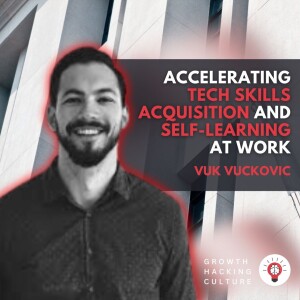
Monday Mar 25, 2024
Monday Mar 25, 2024
In the fast-paced world of technology, a significant gap exists between the skills companies need and the available workforce. This gap arises from various factors: the rapid pace of technological change creates a mismatch in skills among existing employees; there's a global shortage of talent with specific technical skills, leading to fierce competition; and educational institutions often lag behind in preparing graduates for current industry demands. Bridging this gap is essential for ensuring a skilled workforce capable of meeting the evolving needs of the tech industry.
About Vuk Vuckovic
Vuk stands out as a renowned authority in Growth Marketing and CRM, leveraging his expertise as the founder of GrowthOps, previously associated with industry giants like Uber and DeliveryHero. He's acclaimed for championing tech self-learning techniques within organizations.
Stay updated with his insights through his newsletter https://thegrowthops.substack.com/ and connect with him on LinkedIn https://www.linkedin.com/in/vukvuckovic/.
Explore CRM growth solutions at https://thegrowthops.co/.
Get to know more about how people learn in corporate
What We Discussed in this Episode on Self-learning at Work:
- Essential Skills for Global Corporate Competition- Modernizing with Digital Skills- The Vital Role of Meta-Skills in Corporate Success- Realizing the Vision of Self-Learning Organizations- Empowering Employees to Stay Updated- Fostering Tech Skill Development in Teams- The Cost of Ignoring Tech Skill Gaps in Corporations
###
Sign up for the Simply Human Newsletter (monthly email newsletter): https://simplyhuman.substack.com
Follow the Growth Hacking Culture Podcast: https://www.peoplekult.com/podcast-work-culture
Follow Ivan Palomino on Twitter: https://twitter.com/ivanpalomino_
Follow Ivan Palomino on LinkedIn: https://www.linkedin.com/in/ipalomino/
About the Growth Hacking Culture Podcast
The Growth Hacking Culture Podcast is a series of insightful interviews with prominent experts on mindsets, skills and mental resources to grow individually, lead motivated teams and create human-centric work cultures. These episodes are about thought provoking ideas to scale up and growth hack human-centric and performing work cultures. Hosted by Ivan Palomino.
This episode is sponsored by:
PeopleKult [behavioral science, tech and analytics to scale up the next generation work culture]
The Cornerstone Advisory [innovation, performance and growth for future-focused organizations]
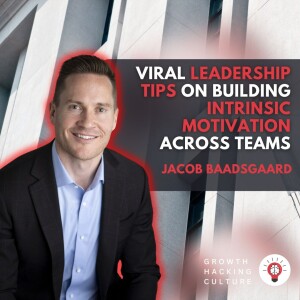
Monday Mar 18, 2024
Monday Mar 18, 2024
Imagine a team where every member is intrinsically motivated, energized, and driven to excel. They're not just working for a paycheck, but because they believe in the work, the purpose, and the impact they create.
The reality is that only 15% of employees worldwide feel engaged at work. This means the majority experience disengagement, which can lead to decreased productivity, higher turnover, and a negative work environment.
Today, the discussion revolves around Viral Leadership strategies to turn this vision into reality.
About Jake Baadsgaard
Jake, the founder and CEO of Disruptive Advertising, is a highly acclaimed Digital Marketing Agency renowned for its exceptional service. His remarkable success is attributed not only to business growth but also to his ability to lead a motivated team.
Jake's unique approach to leadership has propelled Disruptive Advertising to the forefront of the digital marketing industry.
Reach out Jake:
On LinkedIn https://www.linkedin.com/in/jakebaadsgaard/
On Disruptive Advertising https://disruptiveadvertising.com/
What We Discussed in the Episode on Intrinsic Motivation:
- Are corporate teams facing greater motivational challenges today?- Intrinsic vs. extrinsic motivation: A leadership perspective- Key leadership behaviors for fostering team motivation- Empowering employees: Strategies for autonomy and ownership- Tackling demotivating factors in teams.- Motivating remote or hybrid teams: Effective leadership tips- Applying marketing expertise to boost motivation organization-wide
###
Sign up for the Simply Human Newsletter (monthly email newsletter): https://simplyhuman.substack.com
Follow the Growth Hacking Culture Podcast: https://www.peoplekult.com/podcast-work-culture
Follow Ivan Palomino on Twitter: https://twitter.com/ivanpalomino_
Follow Ivan Palomino on LinkedIn: https://www.linkedin.com/in/ipalomino/
About the Growth Hacking Culture Podcast
The Growth Hacking Culture Podcast is a series of insightful interviews with prominent experts on mindsets, skills and mental resources to grow individually, lead motivated teams and create human-centric work cultures. These episodes are about thought provoking ideas to scale up and growth hack human-centric and performing work cultures. Hosted by Ivan Palomino.
This episode is sponsored by:
PeopleKult [behavioral science, tech and analytics to scale up the next generation work culture]
The Cornerstone Advisory [innovation, performance and growth for future-focused organizations]
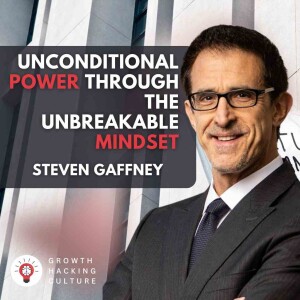
Monday Mar 11, 2024
Monday Mar 11, 2024
Discovering the true expense of underperforming employees is crucial for businesses. A study from the Conference Board reveals that disengaged employees cost an average of $3,400 annually due to lost productivity and increased absenteeism. Recognizing these hidden costs underscores the importance of fostering employee engagement to enhance overall productivity and mitigate financial losses.
About Steven Gaffney [author of Unconditional Power]
Steven Gaffney, renowned author of four impactful books including "Just Be Honest" and "Honesty Works!", is a distinguished figure in change management, honest communication, and team optimization. His latest masterpiece, "Unconditional Power: Thriving in Any Situation, No Matter How Frustrating, Complex, or Unpredictable," delves into fostering a culture of achievement and delineates essential behaviors for achieving peak performance.
His book Unconditional Power: Thriving in Any Situation, No Matter How Frustrating, Complex, or Unpredictable https://a.co/d/6C3iYXy
Stevens' website https://stevengaffney.com/
Stevens' LinkedIn Profile https://www.linkedin.com/in/stevengaffneycompany/
What We Discussed in the Episode On Power, Mindset and Mood:
Exploring the Productivity Boost of Positivity: Insights from the Book: Unconditional Power
The Dynamics of Power: Unraveling Its Connection to Mood
Cultivating Positivity: Strategies for Establishing a Positive Mindset
Fostering High Achievement: Key Actions for Leaders
Integrating Unconditional Power: A Case for Corporate Curriculum
The Challenges of Embracing Unconditional Power: Insights on Practice
###
Sign up for the Simply Human Newsletter (monthly email newsletter): https://simplyhuman.substack.com
Follow the Growth Hacking Culture Podcast: https://www.peoplekult.com/podcast-work-culture
Follow Ivan Palomino on Twitter: https://twitter.com/ivanpalomino_
Follow Ivan Palomino on LinkedIn: https://www.linkedin.com/in/ipalomino/
About the Growth Hacking Culture Podcast
The Growth Hacking Culture Podcast is a series of insightful interviews with prominent experts on mindsets, skills and mental resources to grow individually, lead motivated teams and create human-centric work cultures. These episodes are about thought provoking ideas to scale up and growth hack human-centric and performing work cultures. Hosted by Ivan Palomino.
This episode is sponsored by:
PeopleKult [behavioral science, tech and analytics to scale up the next generation work culture]
The Cornerstone Advisory [innovation, performance and growth for future-focused organizations]
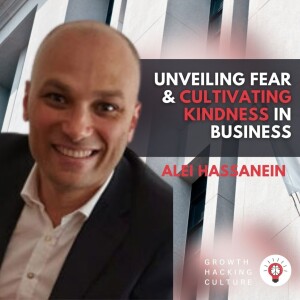
Sunday Mar 03, 2024
Alei Hassanein - Unveiling Fear at Work & Building a Culture of Kindness
Sunday Mar 03, 2024
Sunday Mar 03, 2024
In the dynamic arena of the workplace, where personal bonds thrive and protective measures ensure employee well-being, there exists a silent specter: the pervasive sense of fear that often remains unspoken. According to a recent survey conducted by LiveCareer in 2023, a staggering 87% of respondents admitted to grappling with work-related fears.
Among the most prevalent anxieties were concerns about committing errors (77%), the daunting prospect of public speaking (72%), the specter of termination (67%), the fear of being unpopular among peers or superiors (64%), and the weighty responsibility of decision-making (63%). Discover more about navigating the intricacies of workplace dynamics and addressing the unspoken fears that hinder professional growth.
About Alei Hassanein [author of La Tyrannie de l'Hibiscus]
Alei stands us a recognized pundit in the realm of transformational thought leadership. With a wealth of experience spearheading over 100 multi-million Euro strategic transformation initiatives spanning 4 continents and 20 countries, his expertise transcends industries, encompassing life sciences, industrial, financial, and humanitarian sectors.
As the visionary co-founder of Obicio, Alei's insights have reshaped organizational mindsets, offering compelling alternatives to navigate the pervasive impact of fear in today's workplace landscape.
Alei Hassanein is the author of the novel "The Tyranny of the Hibiscus" is available now in French. This book explores fear in the professional world - Fear, the formidable force that can paralyze our actions and distort our decisions. → https://amzn.eu/d/jgkwenf
Reach out Alei in LinkedIn https://www.linkedin.com/in/aleihassanein/
or in his consulting practice Obicio's Website https://www.obicio.com/
What We Discussed in this Episode:
- Unveiling Workplace Fears: Identifying Common Types in Modern Organizations- The Acceleration of Fear: Examining its Rapid Spread Compared to a Decade Ago- Assessing Organizational Fear: Tools for Companies and Individuals to Gauge Cultural Anxiety- Fear's Roots: Investigating Origins in Society, Family, and Work Environments- Fostering Psychological Safety: Practical Approaches for Fear Reduction in Businesses- Kindness in Business: A Paradigm Shift Towards Productivity and Growth- Integrating Fear Management for Holistic Organizational Development
###
Sign up for the Simply Human Newsletter (monthly email newsletter): https://simplyhuman.substack.com
Follow the Growth Hacking Culture Podcast: https://www.peoplekult.com/podcast-work-culture
Follow Ivan Palomino on Twitter: https://twitter.com/ivanpalomino_
Follow Ivan Palomino on LinkedIn: https://www.linkedin.com/in/ipalomino/
About the Growth Hacking Culture Podcast
The Growth Hacking Culture Podcast is a series of insightful interviews with prominent experts on mindsets, skills and mental resources to grow individually, lead motivated teams and create human-centric work cultures. These episodes are about thought provoking ideas to scale up and growth hack human-centric and performing work cultures. Hosted by Ivan Palomino.
This episode is sponsored by:
PeopleKult [behavioral science, tech and analytics to scale up the next generation work culture]
The Cornerstone Advisory [innovation, performance and growth for future-focused organizations]









